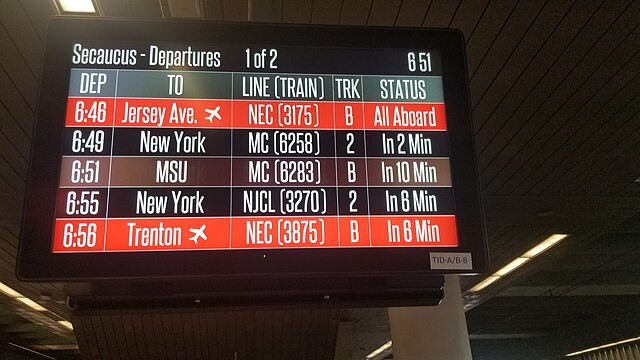Every weekday morning, Brandon Tagoe, a radio producer, boards a train from Elizabeth, New Jersey, to Manhattan's Penn Station, aiming to arrive at his "dream job" by 5:15 a.m. However, New Jersey Transit's (NJT) recent spate of delays has made him chronically late, jeopardizing his professional standing. "I had to be spoken to," Tagoe lamented at Penn Station last week. "I had a meeting with my boss about the importance of being on time, and I've been threatened with repercussions if it continues."
Tagoe's frustration echoes a broader sentiment among NJT commuters who have endured frequent service disruptions. A series of delays and cancellations in June, compounded by aging train cars and infrastructure, have coincided with a 15% fare hike effective this week, leaving riders exasperated and skeptical of any imminent improvements.
Kanesha Hayes, a 39-year-old sanitation worker, expressed her discontent during one of last week's worst delays. "I am paying $200 monthly, they're telling me it's going up, but yet the service is still terrible," Hayes said. "I can't be late all the time. I've gotten written up for being late. My job is all about getting there on time, and I don't want to be out of a job."
The fare hike, the first in nearly a decade, aims to address NJT's significant budget shortfalls. According to Talia Crawford, advocacy and organizing manager for the New York-based Tri-State Transportation Campaign, the agency has been grappling with a budget deficit for over ten years, currently nearing a billion-dollar hole despite a $2.9 billion allocation in 2023.
The chronic underfunding has been palpable for commuters, who recently endured delays caused by various issues, including problems with Amtrak's overhead wires, electrical and mechanical failures of NJT trains, a brush fire in the Meadowlands, and a blown circuit breaker that cut power between Newark and Midtown. NJT President and CEO Kevin Corbett acknowledged the widespread frustration in a statement last week. "We are as frustrated as our customers, and the frequency and impact these issues are having on our customers' quality of life is clearly unacceptable," Corbett wrote, adding that NJT is working with Amtrak to identify and address the root causes of these incidents.
Amtrak, which owns much of the infrastructure and charges NJT approximately $200 million annually for access, also admitted to problems. Amtrak President Roger Harris apologized for the disruptions in a June 21 letter to customers, stating, "We have established a joint team with NJT to identify the source of this damage and implement improvements. Regardless of the causes that led to these delays, you deserve better service, and we are committed to providing it."
Looking ahead, NJT plans to introduce 138 new multilevel train cars, which are expected to be more reliable than the current fleet. Some of these new cars could be operational by the end of the year. Additionally, New Jersey Governor Phil Murphy recently signed a state budget that includes a 2.5% tax hike on the state's largest corporations to help close NJT's budget gap.
However, long-term solutions remain distant. The $16 billion Hudson Tunnel Project, which will build a new two-track rail tunnel between the Bergen Palisades and Manhattan and rehabilitate the existing North River Tunnel, won't be completed until the mid-2030s. This is little consolation for commuters who continue to face daily challenges.
Crawford emphasized that while the corporate tax boost will help keep NJT afloat, it won't address the systemic issues plaguing the service. "This would just get them out of the hole," she said. "It doesn't address any of the service issues and improvements that NJ Transit needs. And it won't add service."
In response to the ongoing service disruptions, NJT and Amtrak officials announced an increase in inspections and maintenance on various infrastructure and fleet systems. "This will be a holistic effort focused on both Amtrak infrastructure - including the electric traction system that powers trains, the catenary, signals, and switches - and NJ TRANSIT equipment, including the pantograph system that connects to the catenary and draws power for the train," the agencies said in a joint statement.
Despite these efforts, many riders remain pessimistic. Dalbert Artiles, a lab technician who commutes from Penn Station to New Brunswick, voiced his concerns, "There are a lot of issues they have to work on to improve service. It's not going to get better anytime soon. I'm expecting it to get worse - and I'm worried about it."




